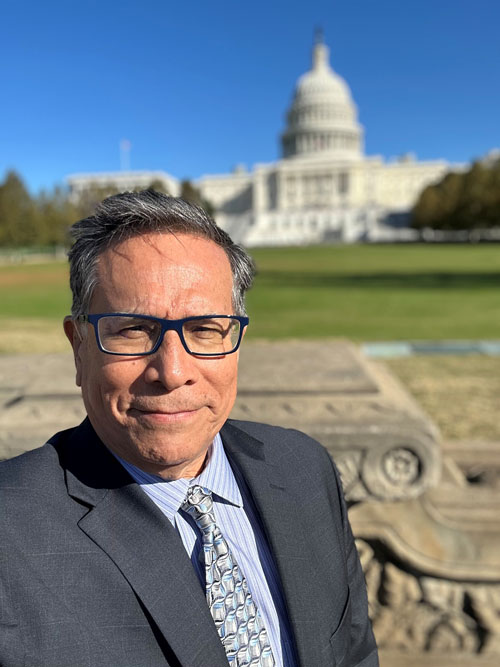Victor Abalos

Intern Counselor
One Love Agency
Member Since 2022
ACA is a community of diverse, vibrant counselors and educators who are changing lives and the world at large. Victor Abalos began his professional career as a journalist before making a career pivot to counseling.
We spoke to Abalos about his experience. Read on for more from that conversation, which has been edited for clarity.
Tell us about your background.
I was born in Douglas, Arizona, a small town on the U.S.–Mexico border where a rich and distinctive culture shaped much of who I am. Growing up in a community where people lived in two worlds — neither fully American nor Mexican — taught me early on the values of individuality, as well as connection. It was a place where storytelling thrived. My own story was also shaped by loss — most profoundly, the deaths of both my sons when they were very young due to illness. That heartbreak is never far from me, but it’s also where I draw my greatest strength and empathy. I’m also in long-term recovery — 24 years sober — and that personal journey continues to deepen my connection with clients who struggle with addiction, trauma and identity.
Can you talk about your professional background and why you chose to pursue counseling?
My first career was in journalism. I spent more than two decades as a broadcast journalist, reporter, writer, photographer and producer. I covered everything, including some of the most difficult events in our nation’s history. Those experiences taught me how to listen, how to bear witness to pain and how to tell human stories with dignity.
As a journalist, I told people’s stories. As a counselor, I now help them reclaim their own. Counseling is a way for me to be of service in a deeply personal way. It allows me to blend my lived experience, including my journey through grief and recovery, with professional skills to help others heal, grow and reconnect with their sense of self-worth. This work feels less like a job and more like a calling.
What are your specific areas of expertise?
I currently work with adults reentering society after incarceration, many of whom struggle with complex trauma, substance use and severe mental health challenges. I also have experience supporting at-risk youth, individuals navigating recovery, and older adults adjusting to aging and loss. I use trauma-informed and strengths-based approaches,
incorporating acceptance and commitment therapy, dialectical behavior therapy and narrative therapy principles. I’m especially passionate about serving Latino working-class families, groups often marginalized in mental health care systems.
How has the experience of switching careers been for you?
Transitioning into counseling has been both humbling and liberating. I went from being the expert in the room to being a student again – and not just in the academic sense. I had to re-learn how to sit with silence, how to witness suffering without trying to fix it right away and how to measure progress not by metrics or honors, but by facilitating transformation. My clients appreciate that I’ve lived a full life, faced challenges and come through with purpose. I believe the best counselors are not those who have never fallen, but those who’ve learned to rise and help others do the same. This second career has given my life new meaning, and I only wish I had done it sooner.
In your opinion, what is the biggest challenge facing the mental health field today?
Access. Too many people, especially those from underserved communities, cannot access affordable, culturally competent care. We also face a workforce shortage – especially therapists of color and bilingual providers. Stigma still prevents many from seeking help, and even when they do, waitlists are long, and resources limited. We need systemic change – better funding, integrated care models and a serious investment in diversifying the pipeline of mental health professionals. Mental health should not be a privilege. It is a human right.
